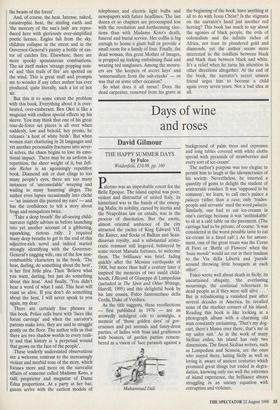It's too damn hot
Andrew Barrow
INFINITE RICHES by Ben Okri Phoenix House, £16.99, pp. 352 Ben Okri's Booker Prize sizzler, The Famished Road, and its somewhat less cele- brated sequel somehow managed to escape my attention, so I was able to approach this new novel, volume three of the same cycle, with my customary fresh, open mind.
Infinite Riches is set in an unnamed hot country, later identified as African and ruled over by a British governor-general during Harold Macmillan's prime-minister- ship. The 'brief nightmare of colonisation' is coming to an end and revolution, inde- pendence and atom bomb experiments are in the air.
To start with, the story seems firmly based or anchored in the room where the child-narrator lives with his Mum and Dad, but nothing is static or stable in this book for long. The room is apparently a room of `infinite riches'. It contains the entire world and nine different continental liberation wars are being fought out on its ceiling.
Some readers may find the dreamy, fan- tastical quality of this novel far from rest- ful. Dreams themselves feature constantly in the story. On one page the word dream or dreaming occurs no less than ten times, and as the narrative continues the halluci- natory material comes thicker and faster. Almost everyone goes mad, or wild, or 'all in a tumble' as the narrator charmingly puts it. We are quickly surrounded by grotesque characters, mischievous spirits and all manner of apparitions. Sooner or later, 'the masters of the great African underworld' mingle with 'the spirits of the unborn', while assorted angels baffle over `the intensity of human suffering'. By page 248 it is time for 'the god of chaos, with uncountable hands and five thousand heads,' to be wheeled on for our edification and delight.
The figures we meet are largely one- dimensional, if not inhuman. Characterisa- tion is not the author's thing. He is concerned with evoking, or caricaturing, the full force of nature in all its frenetic majesty. He is interested in snails, frogs, hyenas and mighty treetops which fall over on top of us. He is interested in magic groves and 'crowded jungle foliage', the language of animals and 'the insomnia of the beasts of the forest'.
And, of course, the heat. Intense, naked, catastrophic heat, the sizzling earth and `the mercury of the sun's lash' are repro- duced here with gloriously over-simplified poetic licence. Eagles fall from the sky, children collapse in the street and in the Governor-General's pantry a bottle of cas- tor oil catches fire. Elsewhere, there are more spooky spontaneous combustions. The air itself makes 'strange popping nois- es' and 'thin trails of fire' are spotted on the wind. This is great stuff and prompts me to wonder if any other author has ever produced, quite literally, such a lot of hot air.
But this is to some extent the problem with this book. Everything about it is over- heated, over-exuberant. Ben Okri is like a magician with endless special effects up his sleeve. You may think that one of his great tour-de-force set pieces is all over when suddenly, low and behold, hey presto, he releases 'a host of white birds'. But when women start chattering in 26 languages and yet another personality fractures into sever- al selves, the chaos begins to lose its emo- tional impact. There may be an artform in repetition, the sheer weight of it, but Infi- nite Riches is an agonisingly repetitive book. Diamond ash or dust clings to too many people's eyes, there are too many instances of `unconsolable' weeping and wailing to many 'haunting' dirges. The author even lapses occasionally into cliché — 'an insistent din pierced my ears' — and has the confidence to tell a story about frogs and mosquitoes twice.
`Take a deep breath' the all-seeing child- narrator rightly advises us before launching into yet another account of a gibbering, squawking, riotous rally. I required many deep breaths to get to the end of this adjective-rich novel and indeed started strongly identifying with the Governor- General's nagging wife, one of the few non- combustible characters in the book. 'The heat, darling, do something about the heat', is her first little plea. Then 'Believe what you want, darling, but just do something about this heat.' And finally, 'You didn't hear a word of what I said. This heat will roast us alive. If you don't do something about the heat, I will never speak to you again, my dear.'
There are certainly fine phrases in this book. Police cells burst with 'faces like forest carvings' and when the narrator's parents make love, they are said to struggle gently on the floor. The author tells us that there are two shadow worlds to every reali- ty and that history is 'a perpetual wound that grows on the face of the people'.
These tenderly understated observations are a welcome contrast to the increasingly violent and morbid tone of the story, which focuses more and more on the surrealist affairs of someone called Madame Koto, a café proprietor and megastar of Dame Edna proportions. At a party at her bar, guests arrive with the earliest models of telephones and electric light bulbs and newspapers with future headlines. The last dozen or so chapters are preoccupied less with the revolution and forthcoming elec- tions than with Madame Koto's death, funeral and burial service. Her coffin is big enough to house a giant bull or provide a small room for a family of four. Finally, the dead woman, this great Mother of Images, is propped up leaking embalming fluid and wearing red sunglasses. Among the mourn- ers are 'the keepers of secret keys' and `somersaulters from the salt-creeks' — or was that on some other occasion?
So what does it all mean? Does the dead carpenter, removed from his grave at the beginning of the book, have anything at all to do with Jesus Christ? Is the stigmata on the narrator's hand just another red herring? This book has much to say about the agonies of black people, the evils of colonialism and the infinite riches of Africa, not least its plundered gold and diamonds, yet the author seems more interested in the conflicts between black and black than between black and white. It's a relief when he turns his attention in other directions altogether. At the end of the book, the narrator's secret unseen friend urges him to become a child again every seven years. Not a bad idea at all.

























































 Previous page
Previous page